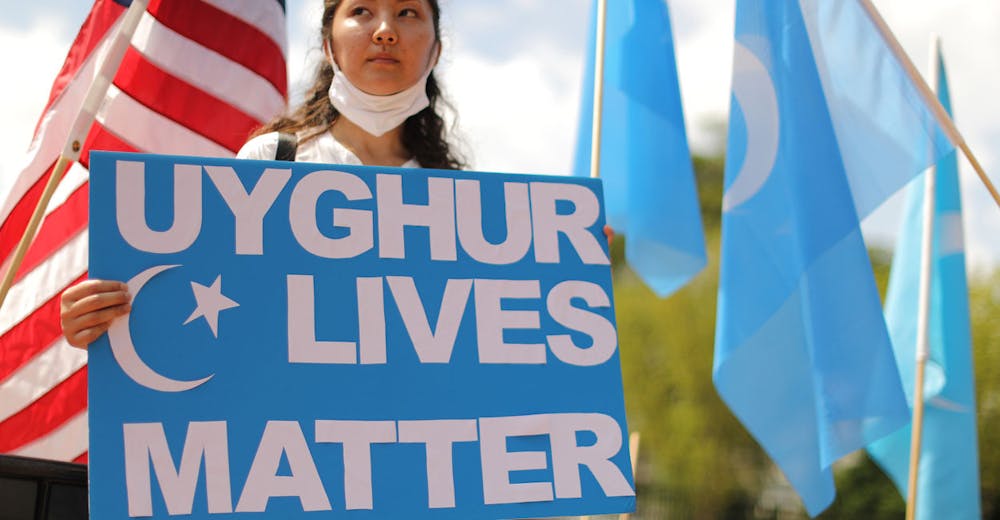The Foreign Affairs Symposium (FAS) held an event titled “The Global Response to the Uyghur Crisis” on Tuesday, April 6. The evening’s panel, part of the symposium’s “Where Do We Go From Here?” speaker series, featured Nury Turkel, board chairman for the Uyghur Human Rights Project; Rushan Abbas, executive director of Campaign for Uyghurs; and Louisa Greve, director of global advocacy for the Uyghur Human Rights Project.
The event was moderated by FAS Co-Directors Ryan Ebrahimy and Margaret Hanson.
Over the past few years, the Chinese government has targeted the country’s Uyghur ethnic minority, detaining over one million people for weeks or years at a time. The U.S. State Department has since labeled these acts as a genocide.
Abbas condemned the Chinese government for its actions against the Uyghur people.
“As we speak, millions of Uyghur people are being destroyed as they languish in concentration camps. Many have already died,” she said. “The torment and the harm that the Chinese regime’s active genocide has inflicted on the Uyghurs is unbelievably cruel. An entire group of people is targeted because of their ethnic identity.”
She brought special attention to the crimes committed against Uyghur women, which include rape; mandatory birth control; and forced sterilization, abortions and marriages.
“This regime has dehumanized Uyghur women,” she said. “They treat their bodies, minds and hearts as property.”
Greve described China’s extreme surveillance of the Uyghur people, comparing the situation to George Orwell’s 1984.
She also explained that many detained Uyghurs are exploited for forced labor. According to Greve, the majority of their forced labor goes toward the region’s cotton industry, which produces 20% of the world’s cotton garments.
“Every company that you know — all the brand names from Zara to Nike to Adidas — unless they have complete supply-chain transparency are likely complicit with a system that takes human beings on the basis of their ethno-religious identity and makes a profit from it,” she said. “Business as usual is a moral failing.”
Turkel agreed with Greve, noting that much of China’s green technology is also thought to be made through forced Uyghur labor.
“The solar panels coming to the United States are believed to be made by Uyghur slaves,” he said. “The Uyghur issue is not a typical human rights issue anymore. It is affecting our lives in many ways... However you see this, it is linked to our personal and national security interests.”
Turkel pointed out that the American desire for a “green revolution” will have to address human rights violations at the core of the movement’s technology production.
He noted that the U.S. has recently made strides toward helping the Uyghurs. These steps, he said, include the Trump administration’s blacklisting of 28 Chinese entities, diplomatic efforts in the United Nations and the passing of the Uyghur Human Rights Policy Act.
“Toward the end of the Trump administration, the plight of the Uyghur people gained new visibility as the administration sought to [improve] its ‘tough on China’ credentials,” he said. “The international response has been timid, tepid or unfocused. Only the United States has taken up the mantle of leadership against ghastly human rights abuses.”
During the event, Abbas also spoke about her sister, who is one of the Uyghur women currently detained by the Chinese government.
“My own sister disappeared from her home six days after I spoke at the Hudson Institute to denounce the Chinese regime’s concentration camps,” she said. “This was a clear attempt to punish me for speaking out.”
Abbas urged attendees to pay attention to human rights violations of the Chinese Communist Party (CCP).
“My sister and millions of others are suffering under the CCP’s genocidal brutality. I cannot bear to imagine what she, a retired medical doctor who is in delicate health, and all the others are going through in those dark dungeons,” she said. “Now, we should demand that our government hold those that profit off of genocide accountable.”
According to Abbas, the U.S. needs to accept more refugees, boycott the 2022 Beijing Winter Olympics and pass more legislation to help the Uyghur people.
Although this event was a panel, the symposium usually invites single speakers.
Sophomore Marisa Thomas, who has attended FAS events in the past, shared that she enjoyed both types of symposium events.
“Having one speaker, you were able to hear more of their opinions, but I liked having the perspectives of multiple people,” she said. “It was really informative, and I liked that they brought people directly connected to the problem.”
Thomas expressed her appreciation for Abbas’ narrative.
“The story about her sister being detained by the Chinese government impacted me a lot because I didn’t realize that they were taking anyone and everyone,” she said.
Ebrahimy, who helped organize the event, described the evening as a success in an email to The News-Letter.
“Our discussion did a great job at showing the chilling magnitude of the issue,“ he said. “Hearing just how intertwined American society is with this crisis will hopefully force students to re-assess what justice and accountability truly means for the Uyghurs, as well as understand their own entanglement with so many important issues on the global stage.”





